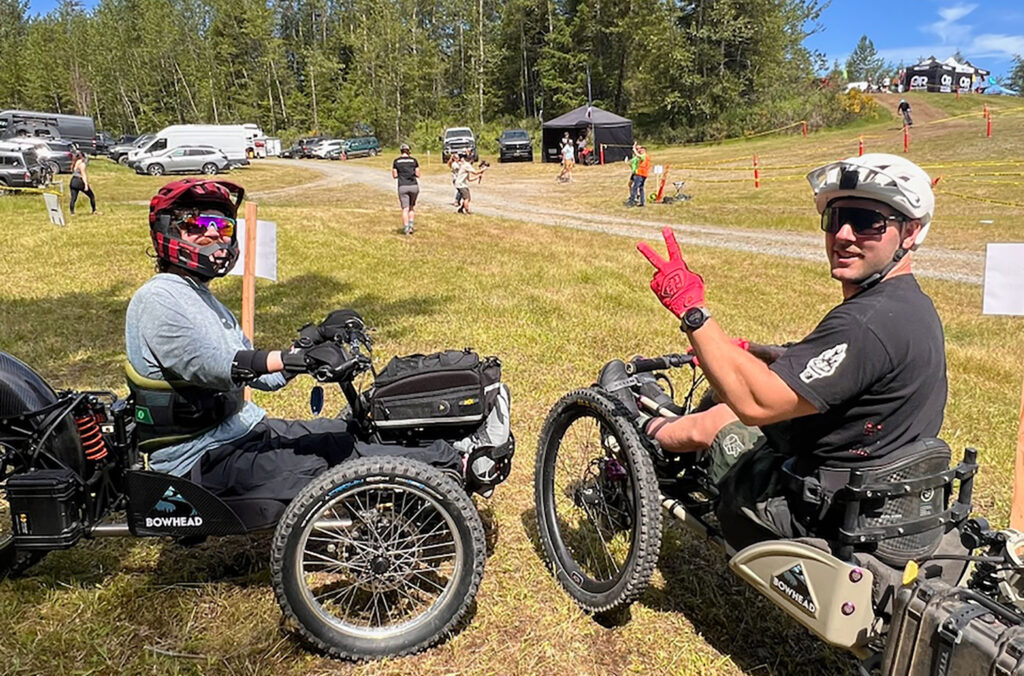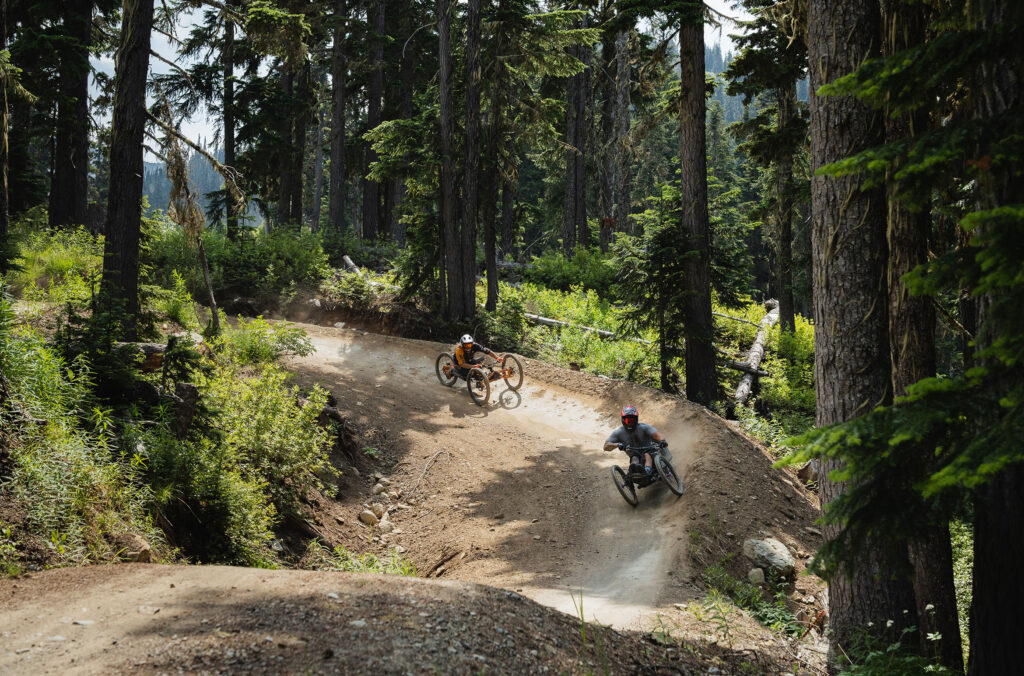When I was learning to sit ski, Whistler was where my development as an athlete really started. Looking back at what drew me to the area, Whistler really is a unique combination: a municipality which takes accessibility seriously, a community that celebrates the variety of ways people with disabilities recreate, and world-class programming from Whistler Adaptive Sports Program (WAS) and Whistler Blackcomb’s adaptive ski program.
We see more and more athletes with disabilities coming to Whistler to recreate and become members of the community, and we’ll see competitors with disabilities from around the world here for the Invictus Games next winter. As we work together to reduce barriers for the disability community, Whistler has a unique opportunity to show it’s the premier destination for the adaptive sports scene.

Adaptive mountain biking is a quickly evolving industry and it’s never been a better time to get started. I’m at the very beginning of my adaptive biking journey this summer. Read on for some of the things I’ve learned and some organizations and riders leading the way.
A Path for Every Rider
Kootenay Adaptive Sport Association (KASA) is leading the way for adaptive trail design and marking. KASA helped review and make recommendations for the Whistler Mountain Bike Park (WMBP) trails. Adaptive riders were able to review and give their feedback directly to Patrol – an important piece that helps ensure authentic disability experiences are included.
WMBP’s adaptive trail designations range from “aMTB Green Square” – like EZ Does It, suitable for offroad handcycles and adaptive mountain bikes with a minimum trial width of 1.4 metres, to “aMTB Double Black” trails like Miss Fire that are under 0.98 metres with widely-varied terrain, steepness and suitable only for the most advanced adaptive mountain bikes and their riders.
Jayden Glentworth is an adaptive athlete from New Zealand living in Whistler. I’ve seen Jayden sit ski and he shows an incredible amount of grace and playfulness on snow. As much as he skis, Jayden bikes even more – you can likely spot him in his very muddy Bowhead Reach lapping A-Line. He was featured in the first Phat Wednesday course preview of the 2024 season – not only a great way to highlight the course but to show how extreme adaptive athletes can be.
As a (very) new adaptive rider myself, I’ve started to get the hang of a few of the Lost Lake trails and my equipment. I had a great time exploring Hooktender and Tommy Moore and climbing through the forest. That is until I ran out of battery! Good thing it was mostly downhill on the way back and only required minimal pushing from friends. There’s room for riders of all abilities to experience the joy of adaptive mountain biking in Whistler.
Whistler Adaptive Sports Program: Empowering Riders
Whistler Adaptive Sports Program (WAS) has played a massive role in helping me understand my capabilities as an athlete and find the right equipment. The first time I tried an adaptive kayak – one I could paddle independently – was on Alta Lake with WAS.
Every disability is different, and equipment that works for one may not work for another. This is exactly where WAS shines – they have worked with a huge range of people with disabilities for over 20 years. They’ve seen it all and always have recommendations. Most importantly – they bring the creativity needed to try new ideas with you, the athlete, at the core. I’ve been on a bit of a journey to find the right adaptive bike for me, and being able to try equipment in WAS’s fleet helped me figure out what the right setup is.
WAS has e-assist handcycles available for guided lessons and tours and a network of PMBIA-certified staff and volunteers to help you have a great experience. Visit the Whistler Adaptive website to learn more, book a lesson and kickstart your adaptive mountain biking journey.
Crankworx: Showcasing Adaptive Athletes
Long a staple in the Whistler biking scene, Crankworx Whistler is not just a festival; it’s a way to bring together the whole mountain biking community and show that adaptive riders are welcome at every level.
The Crankworx team wants everybody to be able to participate and spectate in a meaningful way; Carly Fox runs operations for Whistler Blackcomb adaptive in the winter, and in the summer organizes Kidsworx and Adaptive events, also assisting with event and venue accessibility.
The Adaptive Flow Downhill on July 22 and Technical Downhill on July 23 will have some of the best adaptive riders – I’ll be rooting for Jayden, but cheering on all of the gang. The Adaptive Jam at the Westin Hotel Plaza on July 24 will give you access to demos, coaches, vendors and group rides in the Whistler Mountain Bike Park or Lost Lake.
Some of the particulars – if you’re interested in checking out the timed events at Creekside, Crankworx is allowing parking of vehicles displaying the appropriate accessibility pass/signage in the timing flats itself. Free accessible viewing areas for Joyride are in Skiers Plaza. If you’re interested in the VIP options, the Trackside VIP tier can be accessed by wheelchair users via Mountain Road. Shuttles are also available for guests with disabilities to access the Joyride VIP zone for ticket holders. If you need assistance getting to this zone, you can email VIP@crankworx.com.
No Time Like the Present
Whistler and the entire Sea to Sky have shown how welcoming they are of all the different ways people ride. Make sure to check out Squamish Adaptive Mountain Biking – a grassroots women-led organization increasing access to even more trails in the SORCA network and events like RideLab.
Founder Sierra McCann and I both believe that adaptive athletes are “travelling to mountain bike destinations and finding ways to ride some of the gnarliest mountain bike trails out there with their friends. Trail networks are just starting to see the importance of working with aMTBs to ensure their network is accessible and awesome.”
As I continue my journey, I’m excited to continue learning my own equipment (with fully charged batteries!), and to nerd out on the ins and outs of biking. And maybe some bike packing is in my future – there are a lot of places to see that are out of reach of a standard mobility device like my wheelchair, and I really see my bike as a new tool to get there.
See you out there!
For more information on accessibility in Whistler visit the dedicated page.
Spring offers great value with savings of up to 25% on lodging. Stretch your stay into midweek for even more savings and a quieter village. For every third night you book between March 1 - April 30, 2025, receive a free $75 CAD Whistler Après Voucher.
For summer, book ahead and save up to 30% on lodging. Plus, you'll receive a free $150 CAD Activity Voucher on stays of 3 or more nights.
Insider Tip: BC or Washington resident? Sign up for Whistler Rewards to access additional savings and exclusive perks.

